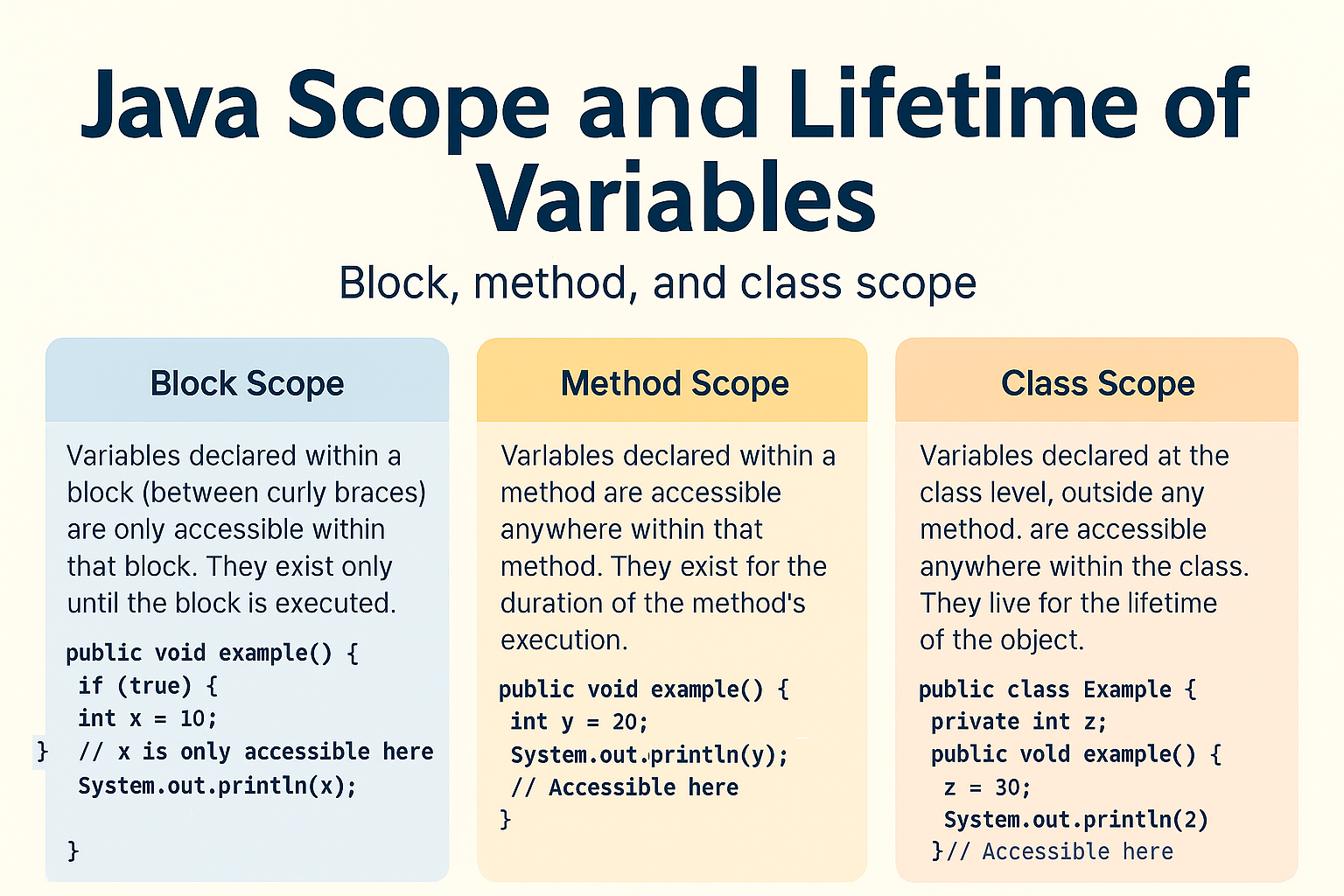Java Scope and Lifetime of Variables – Block, Method, and Class Scope
Understanding the scope and lifetime of variables in Java is crucial for writing efficient, bug-free, and maintainable code. Scope defines where a variable can be accessed, while lifetime defines how long it exists in memory.
🔍 What is Variable Scope?
Variable scope determines the visibility and accessibility of a variable within a program. In Java, scope is controlled by curly braces {} which define blocks of code.
Types of Scope in Java
- Block Scope
- Method Scope
- Class Scope (Instance and Static Variables)
✅ Block Scope
A variable declared inside a block {} is accessible only within that block.
Example:
public class BlockScopeExample {
public static void main(String[] args) {
if (true) {
int x = 10; // Block-scoped variable
System.out.println("x inside block: " + x);
}
// System.out.println(x); // ❌ Compile error: x not visible here
}
}
✅ Method Scope
Variables declared inside a method are called local variables. They are created when the method starts and destroyed when the method ends.
Example:
public class MethodScopeExample {
public void greet() {
String message = "Hello Java"; // Method-scoped variable
System.out.println(message);
}
}
✅ Class Scope
Variables declared at the class level have class scope. These can be either:
- Instance Variables – Belong to individual objects.
- Static Variables (Class Variables) – Shared across all instances of the class.
Example:
public class ClassScopeExample {
int instanceVar = 5; // Instance variable
static int staticVar = 10; // Static variable
public void display() {
System.out.println(instanceVar); // Accessible to all methods
System.out.println(staticVar); // Accessible using class name as well
}
}
🧠 Lifetime of Variables
| Variable Type | Created | Destroyed |
|---|---|---|
| Block Variables | When block is entered | When block exits |
| Method Variables | When method is invoked | When method ends |
| Instance Variables | When object is created | When object is garbage collected |
| Static Variables | When class is loaded into memory | When program terminates |
🚫 Common Mistakes
- Accessing block variables outside their block.
- Relying on uninitialized local variables.
- Overusing static variables causing memory retention.
💡 Best Practices
- Keep variable scope as narrow as possible.
- Initialize variables at the point of declaration.
- Use class variables only when data needs to be shared across all objects.
🧩 Interview Relevance
-
Q: What is the difference between scope and lifetime of a variable?
A: Scope defines where a variable is accessible; lifetime defines how long it exists in memory. -
Q: Can you access a local variable outside its method?
A: No, local variables are method-scoped. -
Q: What happens to static variables when multiple objects are created?
A: Static variables are shared, so all objects refer to the same copy.
📌 Java Version Relevance
- Java 1.0 introduced basic scope and lifetime rules.
- Java 8 added lambda expressions which introduced effectively final variables in block scope.
✅ Summary
- Block Scope: Variables exist within
{}only. - Method Scope: Local variables exist only during method execution.
- Class Scope: Instance and static variables live as long as the object or program.
